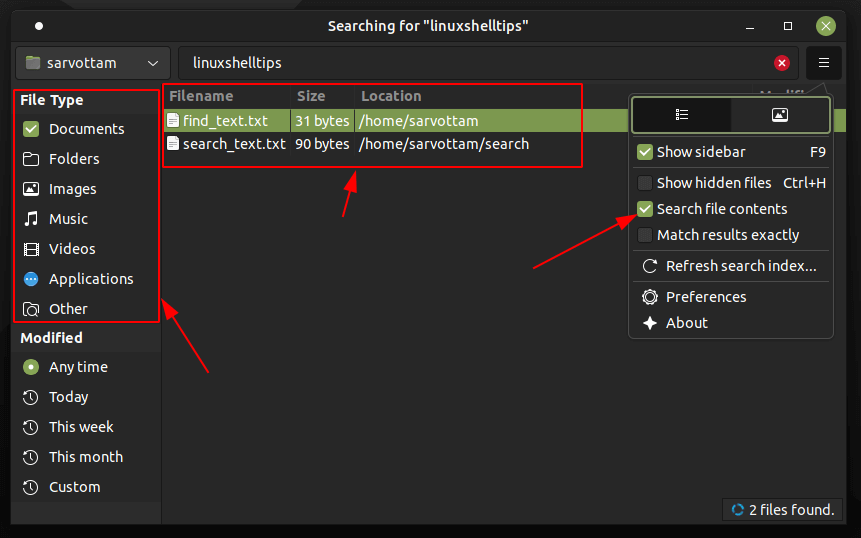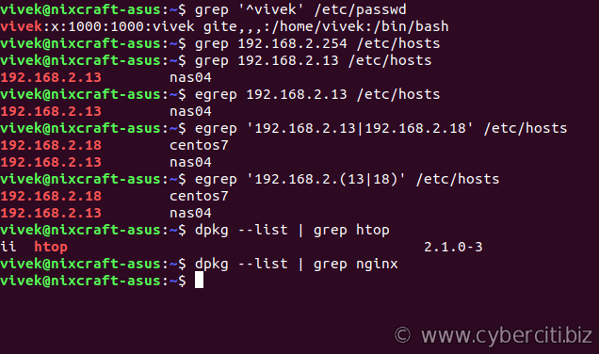

- SEARCH FOR TEXT IN FILES IN LINUX GREP NR HOW TO
- SEARCH FOR TEXT IN FILES IN LINUX GREP NR PDF
- SEARCH FOR TEXT IN FILES IN LINUX GREP NR MANUAL
- SEARCH FOR TEXT IN FILES IN LINUX GREP NR ZIP
Mikrotik Routerboard RB450G Level 5 680MHz
SEARCH FOR TEXT IN FILES IN LINUX GREP NR HOW TO
Example 4 shows how to search an xz-compressed file.Įxample 4: Searching an xz-compressed file $ xzfgrep Mikrotik As with grep, the special variants zfgrep and zegrep for gzip exist as well as bzfgrep and bzegrep for bz, and xzfgrep and xzegrep for xz archives.
SEARCH FOR TEXT IN FILES IN LINUX GREP NR ZIP
With the help of the commands above, you don't have to unpack files compressed with gzip, bzip2, xz and zip before searching - this step happens behind the scenes. Piped to fgrep, the data stream is searched for the given. Zcat uncompresses the given file, and outputs its content to stdout. These tools help you to simplify commands like this: $ zcat archive.gz | fgrep Now, the specialists named zgrep, bzgrep, xzgrep and zipgrep enter the stage. Grep is unable to inspect compressed files properly. In either case the search is a bit quicker than using grep without this special option. Nowadays, current Linux releases keep the commands as binary files. In older Linux releases prior Debian 4 Etch, both commands are implemented as shell scripts that call grep with special options. In contrast, egrep takes the pattern as a Regular Expression and is similar to grep -E (and grep -extended-regexp). fgrep interprets the search pattern as a string of single characters and is exactly the same as grep -F (and grep -fixed-strings). The command grep comes with two special variants - fgrep and egrep. With the help of this you can see if there are matches at all, and if so, in which files.Įxample 3: how to search for all files that contain the term "mikrotik" in any kind of spelling recursively This simplifies the call, and returns a list of files with matches, no matter how many matches exist for each file.

With the exception of highlighting the actual match, Example 3 combines the options -i, -r, and -l as described above. Stop after the first match, and output the file name

The most relevant ones for this article are: Short option
SEARCH FOR TEXT IN FILES IN LINUX GREP NR MANUAL
See the manual page for a detailed description. The first field contains the filename ("invoice-20170015.text"), the second field is the line number within the matched file ("64"), and the third field is the entire line with the matched text ("Mikrotik Routerboard 750GL Gigabit Switch"). On every line, the individual output fields are separated by colons. Invoice-20170045.text:65:MikroTik RouterBoard RB250GS Gigabit Switch Invoice-20170015.text:64:Mikrotik Routerboard 750GL Gigabit Switch Then, the result is as follows:Įxample 2: Calling grep with an Regular Expression, and line numbers $ grep -n Mikroik invoice-2017* To show the line number with grep, use the option -n, or -line-number as the long version. This output is helpful but does not contain the line number. Invoice-20170045.text:MikroTik RouterBoard RB250GS Gigabit Switch Invoice-20170015.text:Mikrotik Routerboard 750GL Gigabit Switch The result is a list of file names with the according matches - one per line preceded by the file name.Įxample 1: Calling grep with an Regular Expression We use grep to search through all files whose name starts with "invoice-2017". Given patterns are interpreted as text or Regular Expressions (see below for an example).Įxample 1 displays how to discover all the occurrences of the brand name "Mikrotik" written either as "Mikrotik", or "MikroTik". grep is designed to find according patterns in entire data streams (files). This is similar to formulating search patterns in the stream editor sed. The name grep is a combination of the initial letters of the four words " global / regular expression / print".
SEARCH FOR TEXT IN FILES IN LINUX GREP NR PDF
Here, the term friends means a group of similar tools that are tailored to a specific data format, or file structure like plain text, compressed files, and PDF documents. But if you want to find files that contain a certain text you'll want to use grep and its friends. If you want to find files with a certain filename using the command line then use either the find or the locate commands. Furthermore, the LPI certification contains tricky questions about this. This topic is essential knowledge for every user of UNIX, Linux, Solaris, OS X, and BSD.


 0 kommentar(er)
0 kommentar(er)
